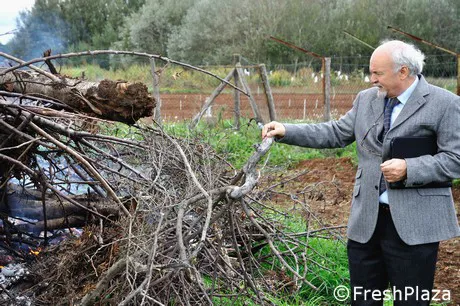Hundreds of plants, 'guilty' of being genetically modified and then subjected to a desiccant treatment and to eradication in June, were piled in a huge pyre and burned in front of a group of teachers and students of the University, journalists and representatives of political movements.

This event represents a bitter defeat of Public Research, in a matter - that of GMOs - still subjected to sterile ideological disputes, instead of being analysed by means of scientific experimentation and collection of verifiable data. Moreover, the research project conducted by the Italian University of Tuscia was authorized in 1998 and it had no risks for humans and for the environment, as testified by many inspections in the experimental site, as well as by leading experts of Italian scientific institutions.
Researchers had already asked for an extension of the authorisation some years ago, but nobody answered. In the meanwhile, Italy failed to identify, as required by EU directives:
1. trial protocols for GMOs
2. suitable sites for GMOs trials
So, technically, no further authorization was possible: on this basis the anti-GMO organisation acted.

Above: the experimental field before being eradicated. Below: what is left today.

Understandable regret was expressed by Professor Eddo Rugini of the University of Tuscia, chief researcher in the GMO studies: "We needed just a few months to reach the long-awaited results of the experiments which could be essential both for the advancement of basic research and for a possible transfer in the field of application. Alas, Ministry of Environment forced us to destroy the field. Important scientific information and huge public financial resources have gone literally up in smoke".

Above and below: Prof. Eddo Rugini looks at what is left of his pluriannual research.

The so hastily destroyed plants - 350 amongst cherry, olive and kiwi - represented the only one experimental field in Italy about genetically improved trees for the needs of the agriculture of the future, when it will be necessary to reduce energy, chemicals and water inputs thanks to more resistant varieties, capable to survive environmental stress and pathogens attacks.

Not the appeals to the highest Italian authorities from prestigious academies and scientific associations, nor the comments posted by prestigious international scientific journals such as Nature, Nature Biotechnology, Le Scienze, nor the thousands of signatures collected by the US Biofortified nor the solidarity coming from the Italian Association of Biotechnologists were enough to avoid destruction. "The Italians have not learned yet from the mistakes of the past," is written in the Biofortified petition by the director of a famous scientific British institution, with a clear reference to the Galileo affair.

Internal sources of the University of Tuscia commented: "What is paradoxical is the absolute lack of foresight by the public institutions. If in ten years things would change and genetic engineering techniques would be considered not only acceptable but even strategic, what will we do, then? Would we start all over again? In the meanwhile, mortifying the Public Research, we have only favored the interests of private lobbies who hold the monopoly on GMOs. A good result, really".

